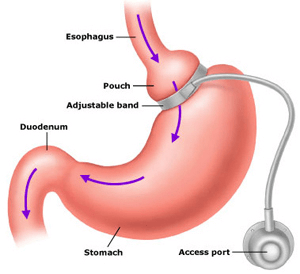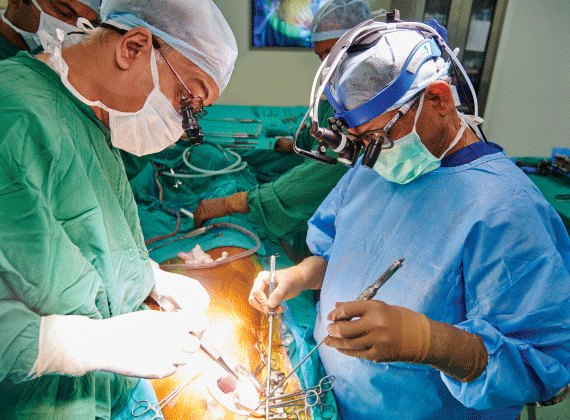If you are considering weight loss surgery, you have a lot of decisions to make. Which weight loss surgery is best for you? There are many different types of weight loss surgery available, and it can be difficult to decide which one is right for you. In this blog post, we will discuss the four most common types of weight loss surgery: gastric bypass, gastric sleeve, adjustable gastric banding, and Roux-en-Y gastric bypass. We will also discuss the pros and cons of each type of surgery so that you can make an informed decision about which one is best for you.
Contents
Different Types Of Weight Loss Surgery
Given below are different types of weight loss surgery:
Gastric Bypass
 A gastric bypass is a type of weight loss surgery that involves creating a small stomach pouch and connecting it directly to the small intestine. This procedure reduces the amount of food you can eat, which causes you to lose weight. Gastric bypass surgery has been shown to be an effective way to reduce body weight and improve health.
A gastric bypass is a type of weight loss surgery that involves creating a small stomach pouch and connecting it directly to the small intestine. This procedure reduces the amount of food you can eat, which causes you to lose weight. Gastric bypass surgery has been shown to be an effective way to reduce body weight and improve health.
The advantages of gastric bypass surgery include
- Faster weight loss: Gastric bypass surgery can lead to rapid and significant weight loss in a short period of time. Furthermore, research has shown that gastric bypass surgery can lead to long-term weight loss.
- Improved health: Gastric bypass surgery has been linked to improved overall health, such as the decreased risk of heart disease, diabetes, and stroke. Moreover, the surgery has been found to be associated with improved quality of life.
- Reduced hunger: The small stomach pouch created by the procedure reduces your hunger, making it easier to stick with a healthy diet.
The disadvantages of gastric bypass surgery include
- Risk of complications: Gastric bypass surgery is a major surgery and carries the risk of potential complications. These can include abdominal pain, nausea, vomiting, infection, internal bleeding, or even death.
- Risk of nutritional deficiencies: Because the surgery involves bypassing part of the digestive system, there is a risk of developing nutritional deficiencies due to reduced absorption of vitamins and minerals. What’s more, you may need to take nutritional supplements for life.
- Expense: Gastric bypass surgery is an expensive procedure, and many health insurance companies do not cover it. In addition to this, the cost of follow-up care and prescriptions can add up quickly.
Gastric Sleeve
 A gastric sleeve is a type of weight loss surgery that involves removing up to 85% of the stomach. This reduces the size of the stomach, which restricts the amount of food that can be eaten and causes weight loss.
A gastric sleeve is a type of weight loss surgery that involves removing up to 85% of the stomach. This reduces the size of the stomach, which restricts the amount of food that can be eaten and causes weight loss.
The advantages of gastric sleeve surgery include
- Effective weight loss: Gastric sleeve surgery has been shown to be an effective way to reduce body weight over time. Studies have found that people who undergo this surgery typically lose 50-60% of their excess body weight.
- Improved health: Gastric sleeve surgery has been found to be associated with improved overall health, including the decreased risk of heart disease, diabetes, and stroke. In addition to this, it has been linked to improved quality of life.
- Reduced hunger: The smaller stomach size reduces hunger, making it easier to stick with a healthy diet. Moreover, the procedure does not involve bypassing part of the digestive system, which means you will not need to take nutritional supplements for life.
The disadvantages of gastric sleeve surgery include
- Risk of complications: Gastric sleeve surgery is major surgery and carries the risk of potential complications. These can include abdominal pain, nausea, vomiting, infection, or internal bleeding. Furthermore, the surgery is irreversible and may not be right for everyone.
- Restrictive diet: After the surgery, you will need to follow a very restrictive diet in order to achieve and maintain weight loss. What’s more, you may need to limit your portion sizes and follow a healthy eating plan in order to stay on track.
- Expense: Gastric sleeve surgery is an expensive procedure, and many health insurance companies do not cover it. In addition to this, the cost of follow-up care and prescriptions can add up quickly.
- Weight regains: Despite the initial weight loss, some people may gain the weight back over time. To prevent this, you will need to continue to follow a healthy lifestyle and adhere to the diet and exercise regimen recommended by your doctor.
- Long-term risks: Though the surgery is generally safe, there are some potential long-term risks that you should be aware of. These can include hernias, ulcers, or vitamin deficiencies. It is important to speak with your doctor about these risks before deciding if the surgery is right for you.
Gastric Banding
 Gastric banding is a type of weight loss surgery that involves placing an adjustable band around the upper part of the stomach. This restricts food intake and helps people to lose weight over time.
Gastric banding is a type of weight loss surgery that involves placing an adjustable band around the upper part of the stomach. This restricts food intake and helps people to lose weight over time.
The advantages of gastric banding include
- Effective weight loss: Studies have found that people who undergo gastric banding typically lose up to 50-60% of their excess body weight over time.
- Improved health: Gastric banding has been found to be associated with improved overall health, including the decreased risk of heart disease, diabetes, and stroke. In addition to this, it has been linked to improved quality of life.
- Minimal invasiveness: Gastric banding is a minimally invasive procedure and typically requires no cutting or stapling of the stomach.
The disadvantages of gastric banding include
- Risk of complications: While the procedure is generally safe, there is a risk of potential complications such as infection, internal bleeding, or band slippage.
- Restricted diet: After the surgery, you will need to follow a very restrictive diet in order to achieve and maintain weight loss. What’s more, you may need to limit your portion sizes and follow a healthy eating plan.
- Expense: Gastric banding is an expensive procedure, and many health insurance companies do not cover it. In addition to this, the cost of follow-up care and prescriptions can add up quickly.
- Weight regains: Despite the initial weight loss, some people may gain the weight back over time. To prevent this, you will need to continue to follow a healthy lifestyle. A healthy lifestyle includes adhering to the diet and exercise regimen recommended by your doctor.
- Long-term risks: Though the surgery is generally safe, there are some potential long-term risks that you should be aware of. These can include band erosion or irritation in the stomach lining, infection, or surgical complications. It is important to speak with your doctor about these risks before deciding if the surgery is right for you.
Which Weight Loss Surgery Is Best For Me?
The best weight loss surgery for you depends on a number of factors, including your overall health and the severity of your obesity. Your doctor can help you weigh the pros and cons of each procedure based on your individual situation. Ultimately, it is important to choose a procedure that you are comfortable with, as well as one that fits your lifestyle.
It is also important to keep in mind that weight loss surgery is not a “quick fix” solution for obesity. It requires dedication and hard work on your part in order to achieve long-term success. You will need to make lifestyle changes, such as eating a balanced diet and exercising regularly, in order to maintain your weight loss. Additionally, you may be required to take certain medications or vitamins for the rest of your life in order to prevent any potential complications.
Ultimately, it is important to speak with your doctor to determine which weight loss surgery may be right for you. Your doctor can discuss the risks and benefits of each procedure, as well as provide guidance on how to make lifestyle changes that will help you achieve long-term success. With an understanding of the different procedures available and a commitment to making healthy choices, you can take the necessary steps toward a healthier, happier future.
Conclusion
Weight loss surgery can be an effective way to achieve long-term weight loss. It is important to understand the potential risks and benefits associated with each type of procedure. Additionally, lifestyle changes and healthy eating habits should be maintained in order to ensure successful and sustainable weight loss results. Ultimately, it is important to speak with your doctor so they can guide you. Doctors can tell you about the best weight loss surgery for your individual needs.
Consider contacting FitMantra for additional information on nutrition and fitness. You can also get in touch with their nutrition experts through our online nutrition counseling, who can guide you through the process and help you achieve your fitness goals. You can also lose weight with the help of our weight loss program. Download our Fitness app on Android to learn more about us.

You really make it appear so easy together with your presentation but I to find this
matter to be actually something that I believe I’d by no means understand.
It sort of feels too complicated and very wide for
me. I am having a look forward to your subsequent post, I will try to get the hang of
it! Escape rooms hub